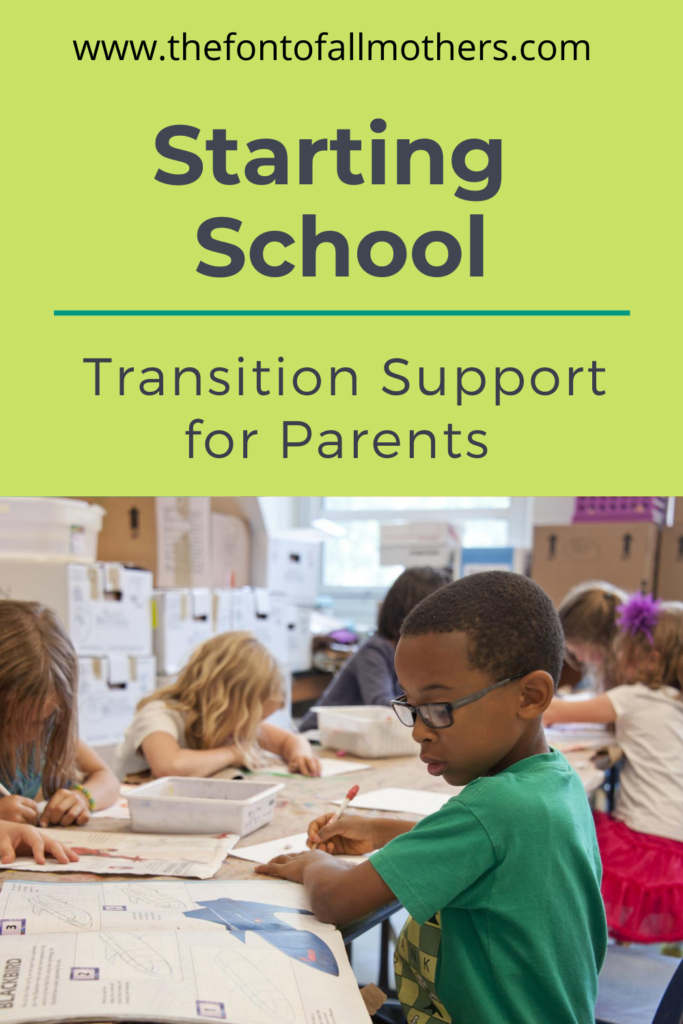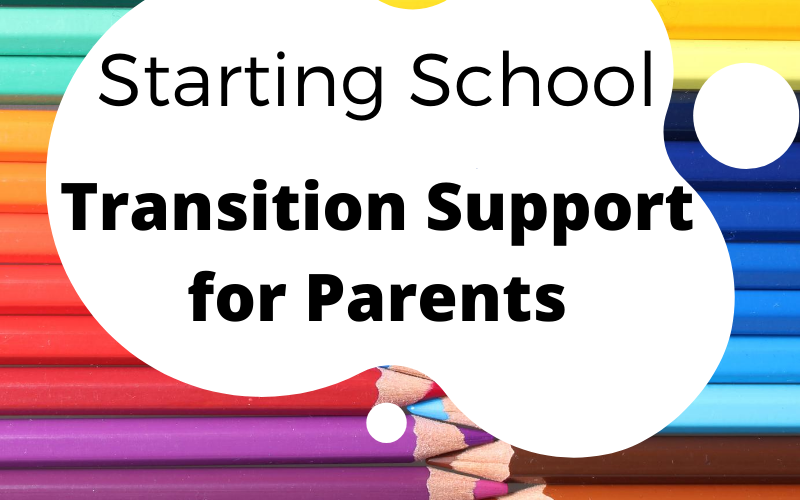Starting school is a huge milestone in a child’s life, so as parents it’s only natural to want to make the transition as smooth as possible. One of the most important things to remember is that children need to feel secure. Without a sense of security, they won’t enjoy their school experience and you will notice the negative impact it has on their emotional, mental and physical well-being.
So in light of that, I always advise parents to make sure their child’s emotional well-being is a priority. Starting school is tough. No matter how confident your child is, there will be moments when they crumble and swear that they hate school or have no friends. While there may be some truth in their worries, it is important to remember that this is a very normal phase in the transition period where children suddenly come to the realisation that school is a permanent thing. A bit like when the honeymoon period is over! haha!
The birth of my youngest coincided with my eldest daughter starting school, and I can’t tell you how anxious I felt for my big girl. As if starting big school wasn’t a big enough event in itself, but to also come to terms with the arrival of a younger sibling and the reality of not being Mummy and Daddy’s only little princess must have been really tough for her. But do you know what? She handled it like the star that she is. Yes she had an uncountable amount of tantrums. Yes she started to behave in ways that we had never witnessed before. But we expected it, and we knew that it was our priority to support her through all the frustration and confusion.
We cried together, we laughed together, we played together and ultimately, we got through it, together.

So How Can You Support Your Child?
If you’re thinking of ways to help your child through the transition to Reception then here are our top tips:
Put your phone down and listen. It’s really as simple as that. We’ve all been guilty of texting or scrolling whilst our children are desperately trying to offload all the scrambled bits of information that they want to share with us, whilst we nod and pretend to be following. So by ‘listen’, I mean, really listen. Their little brains will be taking in so much during those early days, from learning the directions to the playground after lunch, to learning all their peers’ names, to learning to read, to learning the golden rules.. I could go on. They need the chance to talk it through to help them make sense of it all- even if it means having to listen to the same story fifty times!
Which leads to my second important point: children need to feel listened to. Just 20 minutes of your undivided attention will really help you both to reconnect after a busy day of fun and learning. Listening shows them that you care about what they are thinking, feeling and experiencing. Everyone needs someone!
Although most children settle into school fairly quickly (roughly 2-3 weeks), there will be bad days. Prepare for the inevitable after-school meltdowns. School is great fun, but also very tiring, especially if your child has not previously attended a pre-school or nursery full-time. It will take some time to adjust, (even teachers find it tough after the six week holiday!) so be prepared for the seemingly irrational tantrums… I promise, they will pass. As mentioned in our Starting School blog post; make sure you bring an after-school snack. Trust me on that one!
If you are lucky enough to have met some of the other children or parents of your child’s new class and are in contact with them, organising play dates for the weeks leading up to the start of term is a nice way for children to get to know each other. Play dates within the first few weeks are also great for forging early friendships.
Preparing Your Child to Learn
If you’re thinking about how to prepare your child for the learning in Reception then there are a few things that you can do to support:
1. Buy a dry-wipe board or easel. If there is one thing that I always recommend, it has to be this. Children love being able to wipe away mistakes and practise without the pressure of getting it right. Most schools nowadays use them as part of their day to day phonics and maths sessions so your child will love being able to practise at home- My eldest uses hers almost every day! This is a particularly useful resource for children who are hesitant writers. Children often worry about making mistakes and find it disheartening when they have to re-write a word or cross something out. Dry-wipe boards remove this worry as they can give it a go without committing. All they need to do is wipe it away – no evidence, no worries 😊
2. Practise name-writing. Children begin Reception at very different starting points. Some are already able to write their names, whilst others are only just beginning to recognise some letters. If your child is showing an interest in writing and is able to recognise their name, you could write out your child’s name on a piece of card or paper, making sure you are only using a capital letter at the beginning of their name. You could stick it somewhere reachable and at their eye level so they are seeing it often. If you would like some ideas on how to practise name-writing, there are some fun ideas here. Try practising in salt on a serving tray, with chalk outside, in flour on the table or in glitter on a tinfoil covered baking tray. Be creative!
3. Start big! When it comes to writing and mark-making, don’t expect your child to be able to write their letters or numbers neatly within the lines of a narrow ruled sheet of paper! If you do want them to practise on lines, try drawing them wide, about 2 inches apart at first. As your child becomes more confident in writing, gradually reduce the gap between the lines.
4. Read Read Read! Reading is a non-negotiable in our house. Setting the positive habit of reading everyday will help your child to foster a love for reading – even if reading is not your strongest area, there are so many activities that you can do to promote a love for reading. You might be thinking ‘But how? My child can’t read yet.’.. That is absolutely OK. The Reception year is where children build the foundations of reading, learn all the phonics sounds and begin to read simple sentences and age-appropriate texts. At home, you can delve deeper into stories, discussing the illustrations, playing games where your child has to spot a particular word whilst you read to them, or even making up your own stories.
5. Encourage Independence! If you’re used to buttoning up your child’s cardigans or doing up the poppers/zips on their jackets, then now is the time to start stepping back and letting them have a go. They will probably resist at first, but some gentle encouragement will give them confidence to try… and before you know it, they’ll be batting your hands away and insisting on doing things on their own!
We hope that you’ve found this post helpful and that you are feeling ready to tackle the transition to ‘big school’. Feel free to contact us with any questions and we would love to hear any other top tips for starting school in the comments below 🔽🔽🔽🔽
Follow us on Instagram for more fun, practical play ideas!


One Reply to “Starting School: Transition to Reception”